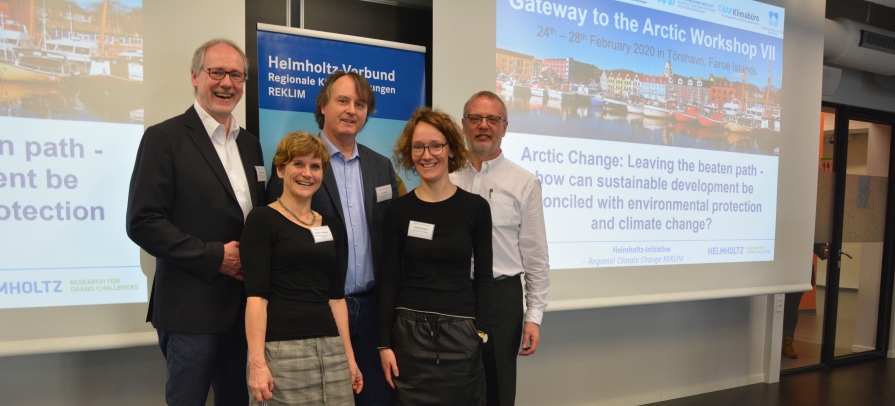Workshop on Arctic issues strengthened cross-disciplinary network
Last week, the University of the Faroe Islands hosted the workshop „Gateway to the Arctic VII - Leaving the beaten path - how can sustainable development be reconciled with environmental protection and climate change? “.
The event was jointly organised by the AWI Climate Office, the Research Initiative for Regional Climate Change REKLIM, the Université de Versailles Saint-Quentin-en-Yvelines (UVSQ) and the University of Faroe Islands.
The goal of the workshop is to bring together young researchers from various disciplines in the natural sciences, social sciences and humanities who have an interest in the circumpolar regions. It provides a forum for intensive exchanges on diverse aspects of modern Arctic research and its political and economic dimensions, in the form of invited talks, discussion groups, and topic-specific workshops. As such, the workshop promotes transdisciplinary networking, especially among young and future researchers in these fields.
The organizer were very happy with the workshop and the visit to the Faroe Islands.
Dr Renate Treffeisen from AWI Climate Office and the Research Initiative for Regional Climate Change REKLIM said:
“The Alfred Wegener Institute Helmholtz Centre for Polar and Marine Research (AWI) and REKLIM are organizing this workshop series together with UVSQ since 2012 as we are convinced that it is important to learn, thinking interdisciplinary in our modern and fast changing world. Building a bridge between the different sciences and between young students and experienced researcher is one of our goals.”
Professor Jan Borm from the Université de Versailles Saint-Quentin-en-Yvelines (UVSQ) said:
"This seventh edition of the Franco-German interdisciplinary workshop for Phd and Masters students has been co-organised with the University of the Faroe Islands, one of UVSQ's new cooperation partners since 2019. This year's workshop brings together students, early stage researchers and academics from over 10 countries including Iran, Lebanon, Montenegro, Turkey, the U.S. and of course the Faroe Islands, Germany and France, but also Greenland. The focus is on discussing ways of leaving the beating track of reflections on climate change and its impact on responsible development in the Arctic by focusing systematically on transdisciplinary approaches (human and social science and natural science) involving this year for the first time also expertise in Arctic law."
Also Dr Klaus Grosfeld from AWI and the Research Initiative for Regional Climate Change REKLIM was satisfied with the outcomes of the workshop:
"The Helmholtz Climate Initiative 'Regional Climate Change (REKLIM)' is one of the host of this interdisciplinary workshop series. The research initiative works among different disciplines since many years and the Arctic is one of its focal areas. Bridging between disciplines and a holistic, transdisciplinary approach in finding solutions for mitigation and adaptation is inevitable to face the challenges of climate change. With the ´Gateway to the Arctic` workshops young scientists are educated from the beginning on this track which will help to think beyond borders and understand the problem in its whole."
This was the first time that the University of the Faroe Islands participated in the annual workshop. Dr Hallbera F. West and Lív Maria Róadóttir Jæger coordinated the effort on behalf of the University of the Faroe Islands. Dr Hallbera F. West highlighted the opportunities for the Faroe Islands:
“For our University, hosting and participating in the Gateway to the Arctic VII was a great opportunity for bringing international transdisciplinary research collaboration related to Arctic development to the Faroe Islands. This gave us the opportunity to exchange research information and to learn more about the challenges that we are facing in this part of the world”.
There were two days with presentations and workshops and one day allocated to excursions, to the salmon producer company Bakkafrost and to the national energy production firm SEV.
As hosts and newcomers in the network, Faroese participants were given the opportunity to give presentations representing different research fields in the Faroe Islands.
The Faroese presentations were:
The Faroes from the view of travellers, by Dr Bergur D. Hansen
The Faroes and the Arctic, by Dr Hallbera West
The Faroese Arctic Corridor, by Professor Bjørn Kunoy
Environmental pollution in the Arctic, by Dr Katrin Hoydal
Geopolitics in the Arctic region, by Dr Jens Christian Justinussen
Transdisciplinary perspectives on climate change and its impact on (Faroese) society, by Dr Ragnheiður Bogadóttir
Photo from left to right: Dr Klaus Grosfeld REKLIM / AWI, Dr Renate Treffeisen REKLIM / AWI, Prof Jan Borm UVSQ, Dr Hallbera West UFI and Prof Chic Collins, Rector of the University of the Faroe Islands.
